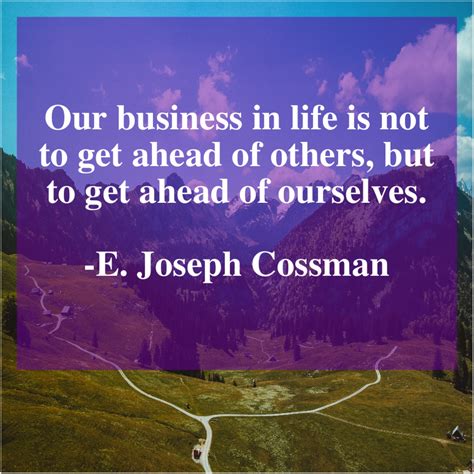A Quote by Donald A. Norman
If you think of the product as a service, then the separate parts make no sense - the point of a product is to offer great experiences to its owner, which means that it offers a service. And that experience, that service, comprises the totality of its parts: The whole is indeed made up of all of the parts. The real value of a product consists of far more than the product's components.
Related Quotes
No product is an island. A product is more than the product. It is a cohesive, integrated set of experiences. Think through all of the stages of a product or service - from initial intentions through final reflections, from first usage to help, service, and maintenance. Make them all work together seamlessly. That's systems thinking.
Fidelity is the total quality of an experience, including a sense of exclusiveness and aura. Convenience is simply how easy something is to get, which often means a low price and ubiquitousness. A super-fidelity product or service would lose its luster and quality if it's pushed too hard toward convenience. A super-convenient product or service would start to get expensive and exclusive if it moved toward higher fidelity, which would naturally undermine its convenience.
I believe a great company, whether improving a sector or creating a new one, needs to have an excellent product or service at its core; needs strong management to execute the plan and a good brand to give it the edge over its competitors. Providing quality service, combined with value for money and in an innovative way ensures you offer real value - and finally to be responsible to society and the planet.
Your business should be defined, not in terms of the product or service you offer, but in terms of what customer need your product or service fulfills. While products come and go, basic needs and customer groups stay around, i.e., the need for communication, the need for transportation, etc. What market need do you supply?
Four things have almost invariably followed the imposition of controls to keep prices below the level they would reach under supply and demand in a free market: (1) increased use of the product or service whose price is controlled, (2) Reduced supply of the same product or service, (3) quality deterioration, (4) black markets.
I think the critical thing is the product or service that you're trying to raise money for. And probably the best description of that, people should say when they hear, "This is what I want to do. This is what I want to bring to the market." They should say, "Gee! That's a great idea" or "Gee! Why hasn't somebody else thought of that before? Well, that's an incredible idea!" In other words, the more a person is delighted, or astonished, or happy with your product, or service, or idea, the more happy they are to put up money for it.
When the functionality of a product or service overshoots what customers can use, it changes the way companies have to compete. When the product isn't yet good enough, the way you compete is by making better products. In order to make better products, the architecture of the product has to be interdependent and proprietary in character.
User experience is really the whole totality. Opening the package good example. It's the total experience that matters. And that starts from when you first hear about a product experience is more based upon memory than reality. If your memory of the product is wonderful, you will excuse all sorts of incidental things.
Part of America's industrial problems is the aim of its corporate managers. Most American executives think they are in the business to make money, rather than products or service. The Japanese corporate credo, on the other hand, is that a company should become the world's most efficient provider of whatever product and service it offers. Once it becomes the world leader and continues to offer good products, profits follow.
It's interesting - what are you willing to give up in terms of your privacy for access to other people? For access to things you think you desperately need. Ultimately, it's that old saying, isn't it? If the service is free, then the product is you. The thing being sold is you. There's a product for sale in you and your data.































